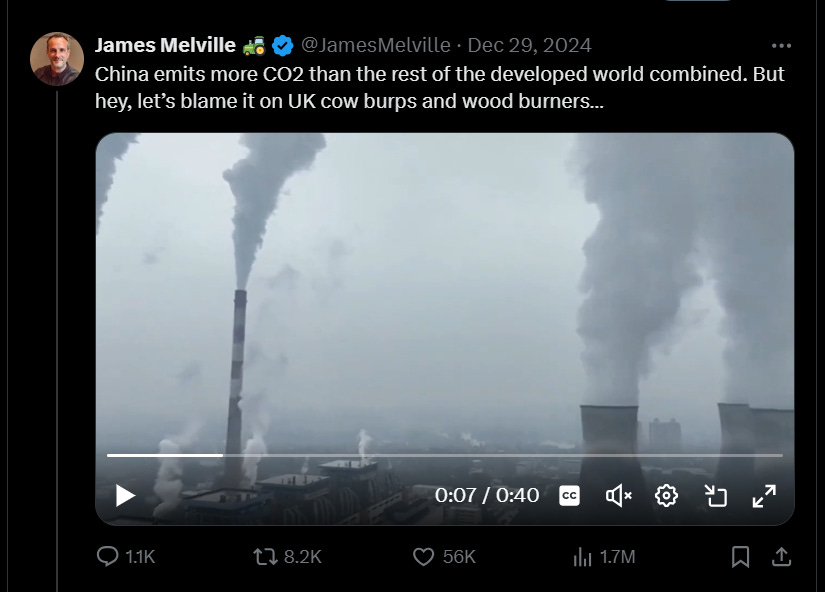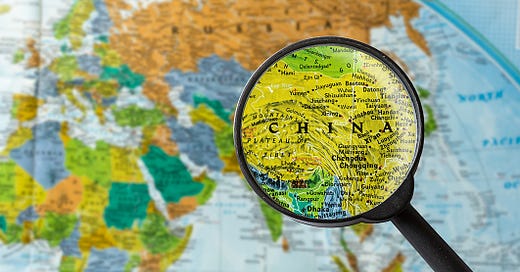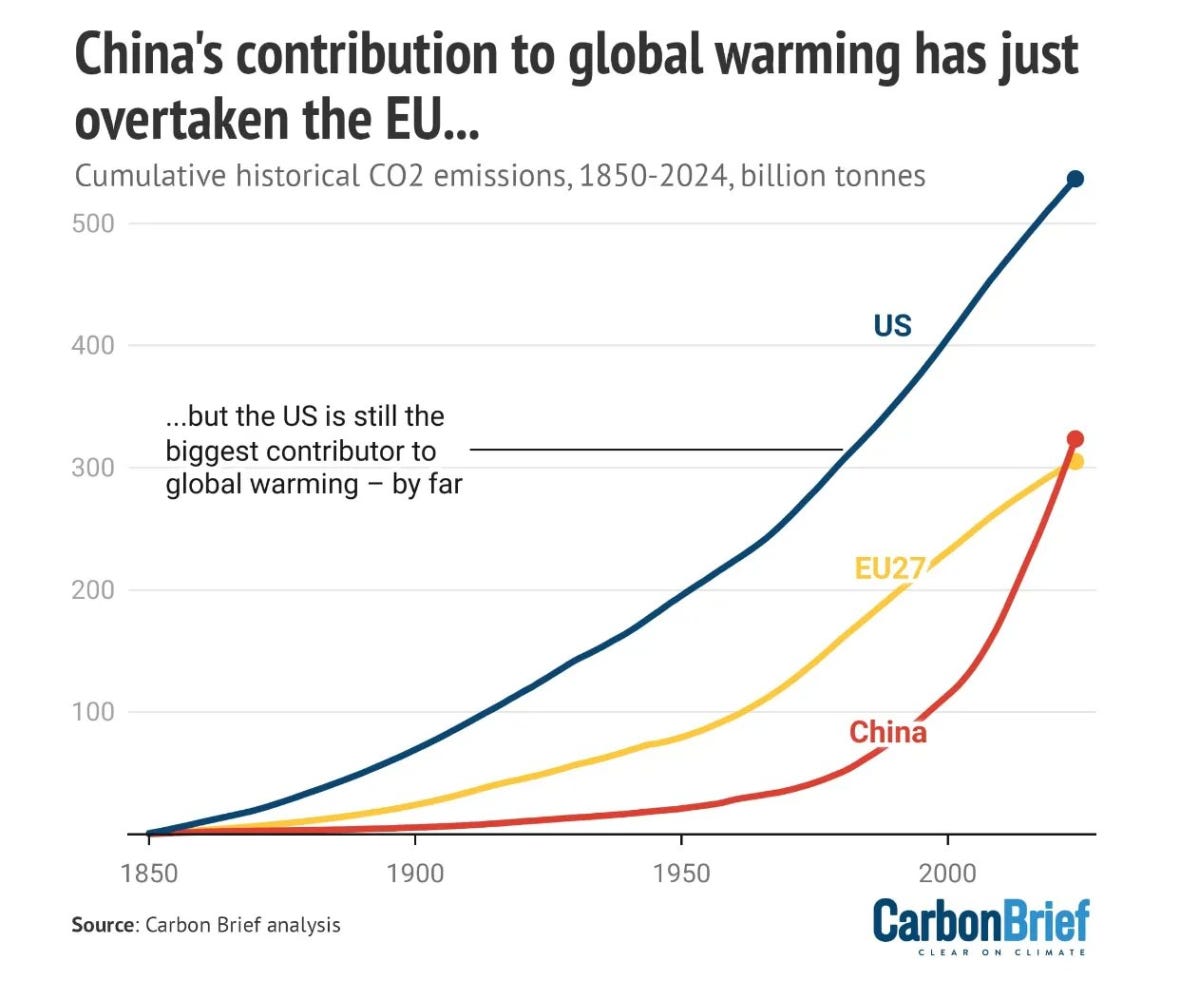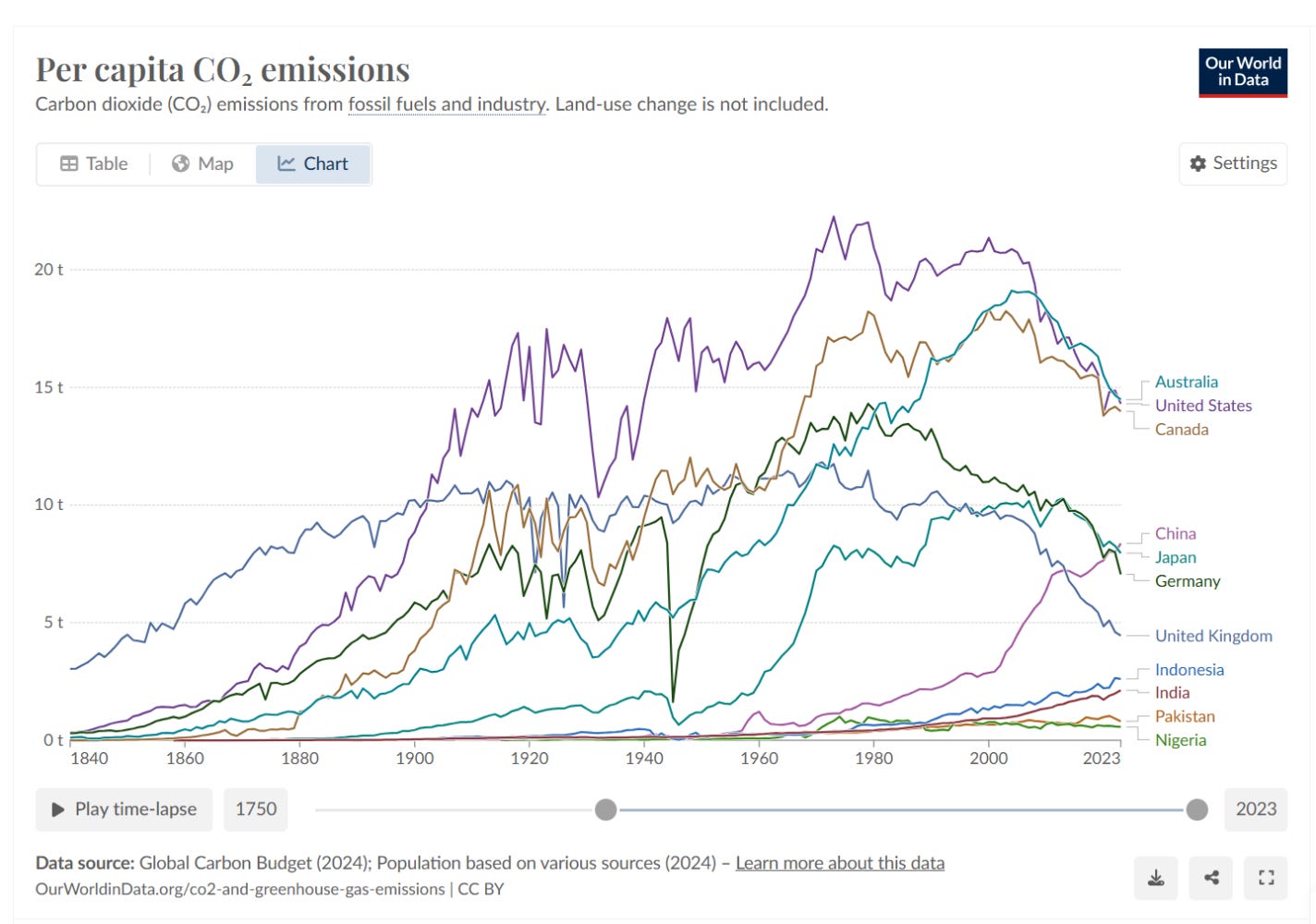Focusing on China's Carbon Emissions Misses the Forest for the Trees
No matter whether China's carbon emissions peak in 2024, 2025, or as late as 2030, I think we should be highlighting something else...
Hi there! It’s a new year, and the time is ripe for some new directions as well. In 2025, I will begin incorporating my writing on other China content into this newsletter, besides the travelogues and taxi driver chats I’ve focused on so far. My full-time job is in the Chinese power sector and I often publish essays and articles on this topic on other platforms. From now on, you can find them here on my own Substack as well, starting with this essay I posted to LinkedIn on January 2 . If you’re primarily following me for the travel content, don’t worry - I will continue posting that as well (and feel free to skip the power sector stuff if it’s not your cup of tea). I appreciate you for being a subscriber all the same!
-David
Happy New Year! I hope everyone’s holiday season was a blast!
I'm back today with a discussion of a genre of China energy commentary that has been popping up on social media with fairly predictable regularity over the last few years. Here's an example from Twitter:

The post will go on to get a bajillion likes on Twitter or LinkedIn and the replies will range from shock, to doomerism, to outright fury, often with a light sprinkling of racism. The motivations of the original poster aren’t entirely important, but they’re rarely pure (indeed, they’re usually looking to avoid taking any personal responsibility, because Look At China).
However, it’s just not a very sophisticated position. I thought it would be instructive to review the main arguments and counterpoints that follow from this initial premise, and identify where they go wrong, to see if we can't get this discussion to a more useful place in the end, and identify what's really important about China, its energy sector, and its emissions.
China IS a big emitter
The broadest strokes of the initial premise aren’t false, of course. China DID have more emissions last year than the entire developed world combined. While those emissions very well may have peaked in 2024 (jury’s still on this one until we can do a year-end calculation, but it’s quite possible) they’re unlikely to start declining in a substantial way before 2030 (which is when the Chinese government has officially pledged to peak its emissions). Best-case scenario, as far as I can see it, is a plateau or very modest emissions decline between 2025-2030.
The growth of the carbon emissions in recent years has been moderated considerably by the massive growth in renewable energy. Renewables have allowed China’s energy demand to grow at a high rate each year, while checking fossil-fuel growth to a bare crawl. But crawl upward it does. Most of new power demand met by renewables is not the same as all new power demand met by renewables (something I had hoped would happen in 2024 but now seems unlikely). And of course, even after those emissions peak and begin to decline, China will continue to be the largest individual contributor to global carbon emissions for many years. On a historical cumulative basis, China has already passed the EU-27 and is now second to only the USA.
But is this the right way to look at it?
“Wait!”, a hypothetical (and indignant) commentator exclaims. “That’s hardly fair at all.” Doesn’t China have a much larger population than the USA or the entire European Union combined? Why are we looking at total emissions? Wouldn’t it be much more reasonable to look at emissions per capita? That’s the only way to really tell if China’s consuming more than its fair share?”
“Furthermore…” our indignant commentator continues. “Isn’t China the world’s factory? How many of those emissions are associated with producing goods that are consumed in other countries? Those are other countries’ offshored emissions!”
Our indignant commentator has made reasonable points, and these are indeed two of the most common rebuttals. China has a lot of people who each need to consume energy…do the numbers still look so bad from this perspective?
Well…no. On a per capita basis, Chinese emissions are much less remarkable. They’re about 2x the level in countries like France or the UK, similar to countries like Germany or Japan, and 50-75% lower than in countries like the USA, Australia, or Canada. If each Chinese province was instead a medium-large country, we could say we have around 30 Germanys or Japans – each of them with a reasonable volume of carbon emissions for its size.
And yes, if we did a further adjustment for the emissions that have been offshored to China with the goods consumed elsewhere, the Chinese per capita numbers are even less troubling. Calculation approaches vary, but some studies estimate around 10-15% of China’s emissions are consumed elsewhere. On this basis, Carbon Brief estimates China has not yet passed the EU in total historical emissions.
So what?
These arguments, compelling as they may be, also walk into rebuttals. China is not actually 30 Germanys; it’s one China. It has the ability to set energy policy for the equivalent of 30 Germanys simultaneously, thereby moving the needle on emissions reduction far more than any other single country can. Furthermore, Earth’s atmosphere doesn’t know whether China’s emissions are low on a per capita basis; it only cares that emissions are rising, and China is the largest emitter. It doesn’t know whether China’s emissions actually belong to another country – they’re happening within a geographic region subject to Chinese regulations and laws. If we don’t point the finger at China, where should we point the finger?
The Equity Problem
This rebuttal seems logical, but it too runs into a problem – not of logic, but of equity. How can those who already enjoy energy abundance seek to deny developing nations the opportunity to exit energy poverty with the most affordable energy sources available? That means fossil fuels, in most places in the world. Unlike developed nations, developing nations may experience annual energy consumption growth of 5, 7, even 10%. Should developing nations (which include China, make no mistake) be expected to “take action” on climate change and cap their emissions (and energy consumption) before their citizens enjoy energy abundance like those of the developed world? Isn’t that just unfair?
Yes, yes it is unfair. And yet…it’s also brutally factual that seeking “fair” per capita emissions according to the standard set by the most carbon-hungry Western nations is utterly untenable.
The planet cannot accomodate more countries pursuing carbon gluttony the way the USA or Canada or Australia have. Indeed, even if we say those nations are outliers, and a “fair” level is closer to China’s own current per capita emissions, allowing every other developing country to bring their per capita emissions to that level will be ruinous for the planet.
To reach Chinese per capita emissions levels, India and Indonesia would see their emissions 4x, while Nigeria or Pakistan's would need to 10x. By the time we achieve per capita emissions parity with China for every citizen in the developing world, we’re well above a 3-degree rise scenario, the world’s coastal metropolises are underwater (including Shanghai and Hong Kong), a dozen ocean nations have ceased to exist entirely, and the cumulative economic damages are in the kazillions, give or take. So, no, we can’t actually afford to be "fair" when it comes to emissions. The citizens of some nations are already consuming so much more than their share of the global emissions budget that there’s simply no margin left for the rest of the world to join.
As I mentioned earlier, this is logical, but it is not just.
It’s not just for China, looking at the relative energy abundance enjoyed by citizens of the USA, nor is it just for the citizens of India or Nigeria or Indonesia, with even lower emissions per capita than China. Leaders in those countries are presented with an impossible choice: consume less than your global fair share (subjecting your citizens to energy poverty) or proceed with no regard for the crushing long-effects of an increasingly unstable climate and rising oceans.
Shall they be denied the energy abundance that has enriched the lives of citizens in other nations, merely because they had the misfortune of being born in the wrong century?
The Way Out
For now, there is truly only one equitable escape from this dilemma, and China is modeling how it must be done in a developing country. It’s a two-step process:
1. Get clean energy to be as cheap or cheaper than fossil-fuel alternatives, such that using clean energy isn’t a sacrifice for affordability.
2. Build that clean energy at such scale that your citizens can grow their energy usage as much as they like without consuming more fossil fuels*
*of course we hope they incorporate energy efficiency practices and aren’t irresponsible in their growth
Unless we figure out how to cost-effectively extract carbon from the air (Direct Air Capture) or capture it perfectly at the smokestack (CCS), this is the best we've got... a just solution to an unfair scenario, allowing developing nations to exit energy poverty without adding to emissions.
Developed nations are welcome to worry about "cow burps and wood burners", as our screenshotted Twitter user mentioned, especially those whose citizens already consume much more than their fair share on a per capita basis. The more those countries can do towards creating additional headspace, and the more carbon budget they free up, the more flexibility developing nations have to pursue energy equity without tipping the carbon needle in the wrong direction. Small contributions help, and efforts to convince you otherwise are usually efforts to avoid personal responsibility. They should be called out as such.
However, at this point, China is almost the only country in the world close to meeting a high growth rate for power consumption entirely with clean energy (Brazil may also qualify). Some may look at China's coal-fired generation and emissions rising 1% in 2024, or look at how coal is still ~60% of the electricity mix, as a sign that we're losing the fight against fossil fuels and that the promise of clean energy is a farce. These people fail to recognize how incredible that number is, and how close China is to solving the puzzle. This is what I wish more people were focusing on.
When China's energy needs rise 7%+ in a year, but coal-fired generation rises just 1%, we should see this as an indicator of how very close China is to finding the solution...meeting its massive developing-country level of power consumption growth entirely with clean energy sources. This is the blueprint for the Indias and the Indonesias and the Nigerias of the world, to eventually ascend to an equitable level of energy consumption without asking for another cent from that already-overdrawn carbon budget. China is charting the path, and it's almost found the exit. Indeed, once the whole-of-economy emissions are calculated for 2024, it's very possible they've already begun to fall (power sector emissions will be up, but other sectors will be down).
Conclusion
China will surely get there, if not this year then the next, not with energy efficiency, conservation or degrowth, but by creating an entirely different energy development model. Could they do it faster or more efficiently? Probably. They're the first ones doing it, so there's bound to be missed opportunities, friction caused by ineffiency, wasted resources and time. If the grid was set up differently, if the markets were arranged differently, if the economic incentives and KPIs were managed differently, if the power structures were different, yes, it could probably all be faster. But despite ALL of that, despite all the missteps or missed opportunities, they're still doing it.
So no, I don't think pointing the finger at China is reasonable. I'm actually not inclined to point the finger at anyone, except perhaps those who seek to point fingers to avoid taking on any personal responsibility. The excesses of some nations mean China has been denied the opportunity for its own carbon-heavy solution to per capita energy abundance. In pursuing clean energy, it has escaped the horns of the dilemma, creating a solution where it may continue to increase energy abundance without growing emissions. This approach will then become available to every country trailing it on the development ladder. This is far too consequential to dismiss. It might be the most important thing that's happened in the entire energy transition so far.
Happy New Year! Here's to an amzing 2025!






Great article. If I were seriously worried about carbon emissions I would be pointing out to others that yours is a balanced and optimistic approach.
But carbon dioxide is plant food first and foremost. I live in an arid part of the world where our eucalypts are capable of surviving on very little water and I can see the result of the slightly improved availability of carbon in the greening of the local environment. Being 82 years old and a farmer, and having lived at the same location since 1978 I see that the foliage of the trees is more extensive than it used to be. Last year was hot and dry and I saw some trees die. That's part of normal. This year is cooler and the rains persisted later and the bush is in recovery mode.
Secondly, radiation theory is all well and good but there is a countervailing force that is not taken into account and that is convection.
Thirdly, and this indicates the impact of convection, at about 10km in altitude in the mid latitudes, the air stops cooling as we ascend and it starts to warm due to the presence of ozone that is a potent absorber and instant emitter of radiation in the frequency that is at the core of Earth's emissions. I see no evidence in the temperature data that the warming at 10km in elevation is responsible for any warming at 9 and 8 km in elevation.
Fourth, we know that the climate of the Earth is unstable and it was ever thus. The atmosphere contains gases that carry an electric charge that makes it capable of acting as a plasma that responds to a change in the local magnetic field. The magnetic field within the atmosphere is impacted by our own and other suns. It is the atmosphere in the winter hemisphere that is most susceptible to be impacted in this way. Here the atmosphere rotates in the same direction as the Earth but faster. It is in the winter hemisphere that ozone best survives the impact of short wave radiation from the sun. Low pressure cells in high latitudes where the air ascends from 5km through to 50 km are driven by the absorptive power of ozone, using the radiation emitted by the Earth itself, demonstrating the power of convection driving change in the distribution and movements of the atmosphere at ground level.
The temperature of the air at any place on Earth depends on where the air is coming from, not its CO2 content.
The mid latitudes of the Northern Hemisphere was cooler in the little ice age of the 1600s when the Thames River regularly froze over in winter. For three centuries it has been warming. The increase in CO2 only began in the 1950s.
Finally, the entire Southern Hemisphere has not warmed at all in the month of January for the last three decades.
'Global Warming' and now 'Climate Change' is a religion. It is not based on science. Science is based on observation.
One must distinguish between particulate carbon that is 'soot' and carbon dioxide that is an invisible gas that has no odour. It is present in the atmosphere at the rate of about one molecule in four thousand.
That said, people who live in cities need to be using electric cars if they want clean air.
China has mastered the technology of burning coal with the greatest efficiency but of course there are still many less efficient plants.
In countries where renewables are employed to the extent of 20% of the electrical power used, the cost of generating electricity is five times more than it is in China. Without cheap electricity it is not possible to be competitive with China.
Nice take. I would point fingers at the developed countries for falling short on providing grants and interest free financing for green energy and development in the Global South. Don’t let them off the hook!